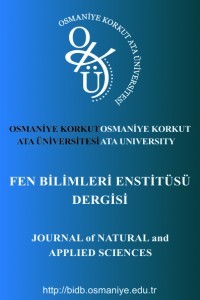Erkek Japon Bıldırcınlarının (Coturnix coturnix Japonica) Karma Yemlerine Farklı Seviyelerde Çörek Otu (Nigella Sativa L.) Tohumu Katkısının Performans, Serum Ölçütleri ve Üreme Hormonları Üzerine Etkisi
Çörek otu tohumu, Bıldırcın, Performans
The Effect of Adding Different Levels of Black Cumin (Nigella Sativa L.) Seed to The Feed on Performance, Serum Parameters and Reproductive Hormones in Male Japanese Quails (Coturnix Coturnix Japonica)
Black cumin seed, Quail, Performance,
___
- [1]Demirci M., Karslı MA., Aluç Y. Determining the effects of black cumin seed oil on performance and meat fatty acid profile of broiler chickens, South African Journal of Animal Science 2019; 249(5): 892-899.
- [2] Naz H. Nigella sativa: The miraculous herb, Pak. J. Biochem. Mol. Biol. 2011; 244(1): 44-48.
- [3] Tufan T., Arslan A., Sarı M., Kaplan O. Japon bıldırcınlarının rasyonlarına çörek otu (Nigella sativa l.) tohumu veya çöre yağı ilavesinin besi performansı, karkas özellikleri ve bazı kan parametrelerine etkisi, Kafkas Üniv Vet Fak Derg. 2015; 21(4): 596-599.
- [4] Işık S., Erdem SA., Kartal M. Investigation the fatty acid profile of commercial black cumin seed oil and seed oil capsules: Aplication to real samples, Journal of Chemical Metrology 2019; 13(2): 53-60.
- [5] Kumar P., Patra AK. Beneficial uses of black cumin (Nigella sativa L.) seeds as a feed additive in poultry nutrition, World's Poultry Science Journal 2017; 73(4): 872-885.
- ISSN: 2687-3729
- Yayın Aralığı: Yılda 3 Sayı
- Başlangıç: 2018
- Yayıncı: Osmaniye Korkut Ata Üniversitesi
Behlül SEVİM, Yusuf CUFADAR, Yılmaz BAHTİYARCA, Seyit Ahmet GÖKMEN, Barışcan CURABAY, Tugay AYAŞAN
Ömer Faruk CANSIZ, İbrahim ERGİNER, Ebru DOĞRU
Ömer Faruk CANSIZ, İbrahim ERGİNER, Fatih ERİŞEN
S-Tipi Granitlerdeki Beyaz Mikaların Raman Karakteristikleri: Yozgat İntrüzif Kompleksi Kuzey Bölümü
Musa Avni AKÇE, Yusuf Kagan KADIOĞLU
Web 3.0 – Anlamsal Ağ Çalışmalarının Farklı Alanlarda Kullanımı: Bir Uygulama Geliştirme Örneği
Fatih Çağatay BAZ, Hilmi Cihan MERAL
Görgü Pb-Zn Yatağı Civarındaki Maden Atıklarının Yüzey ve Yeraltı Sularına Etkisi (Malatya-Türkiye)
Muhammed Kutluhan SUROĞLU, Hatice KARA, Leyla KALENDER
Dönen Bir Silindir Etrafındaki Akış Yapısının PIV Yöntemi ile Deneysel Olarak İncelenmesi
Cemre POLAT, Doğan Burak SAYDAM, Mustafa SÖYLER, Coskun ÖZALP
On the idempotents of semigroup of partial contractions of a finite chain
Muhammad Mansur ZUBAİRU, Bashir ALİ
Yer Fıstığı Tohum Kabuğu Kullanarak Geleneksel Yöntemlerle Yünün Doğal Boyanması
